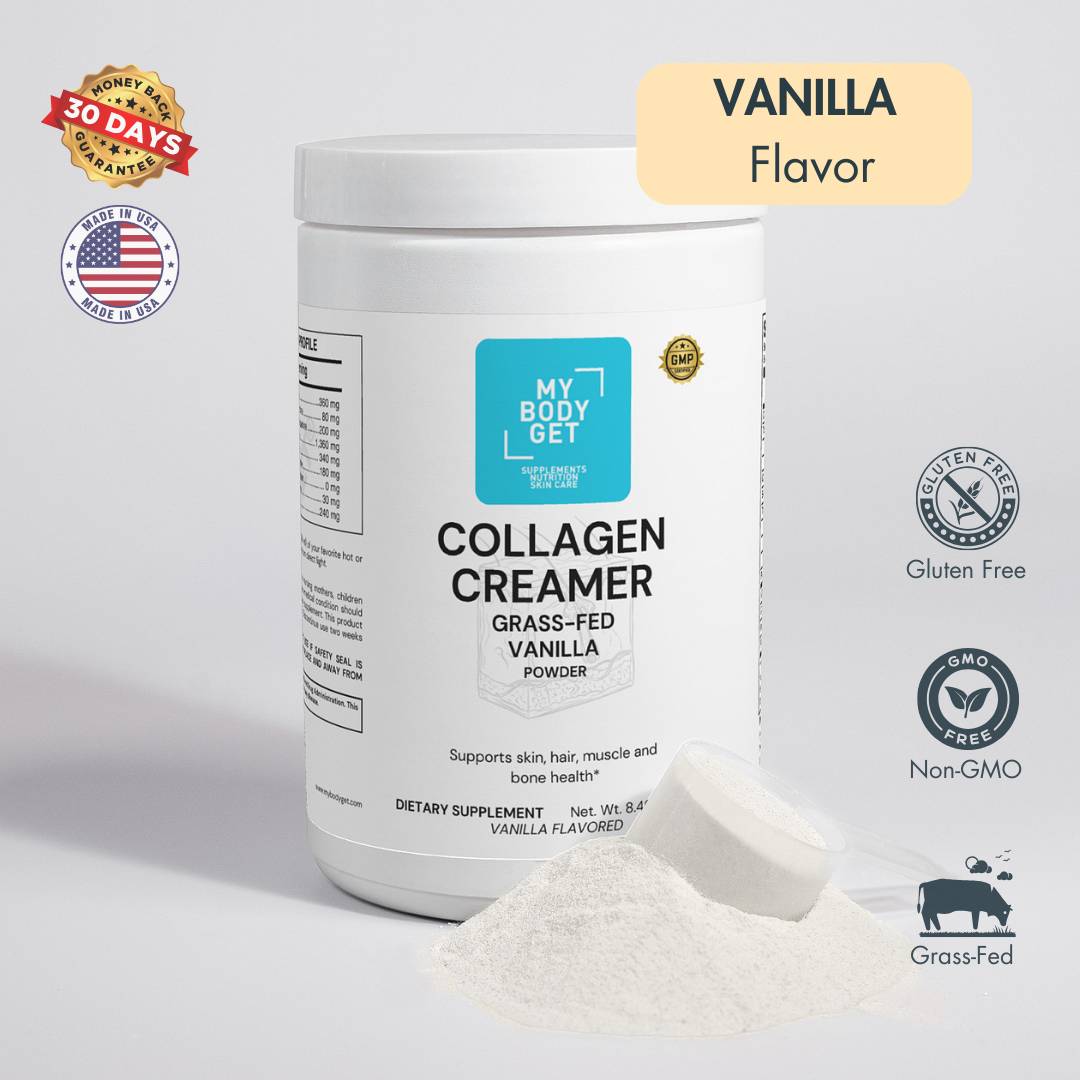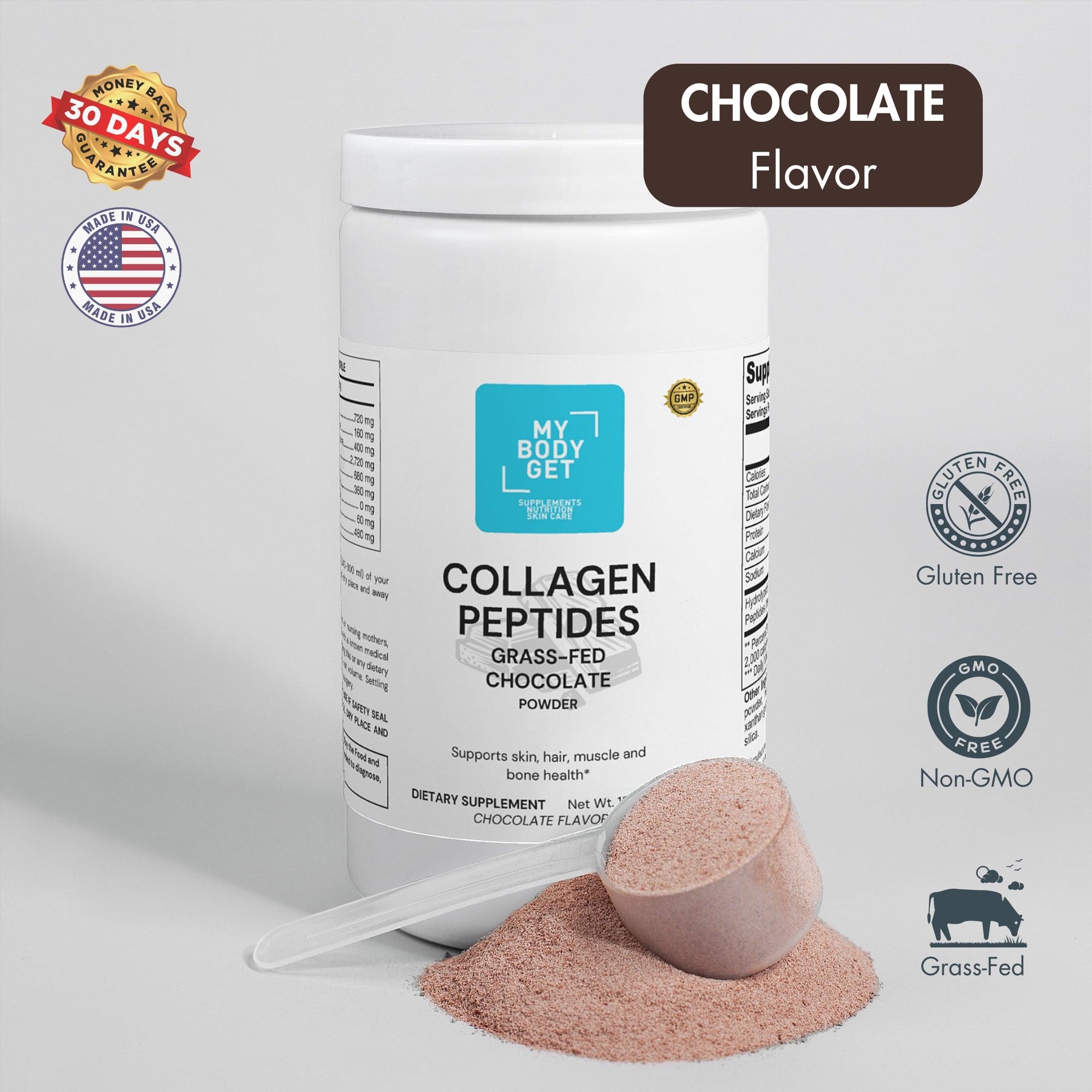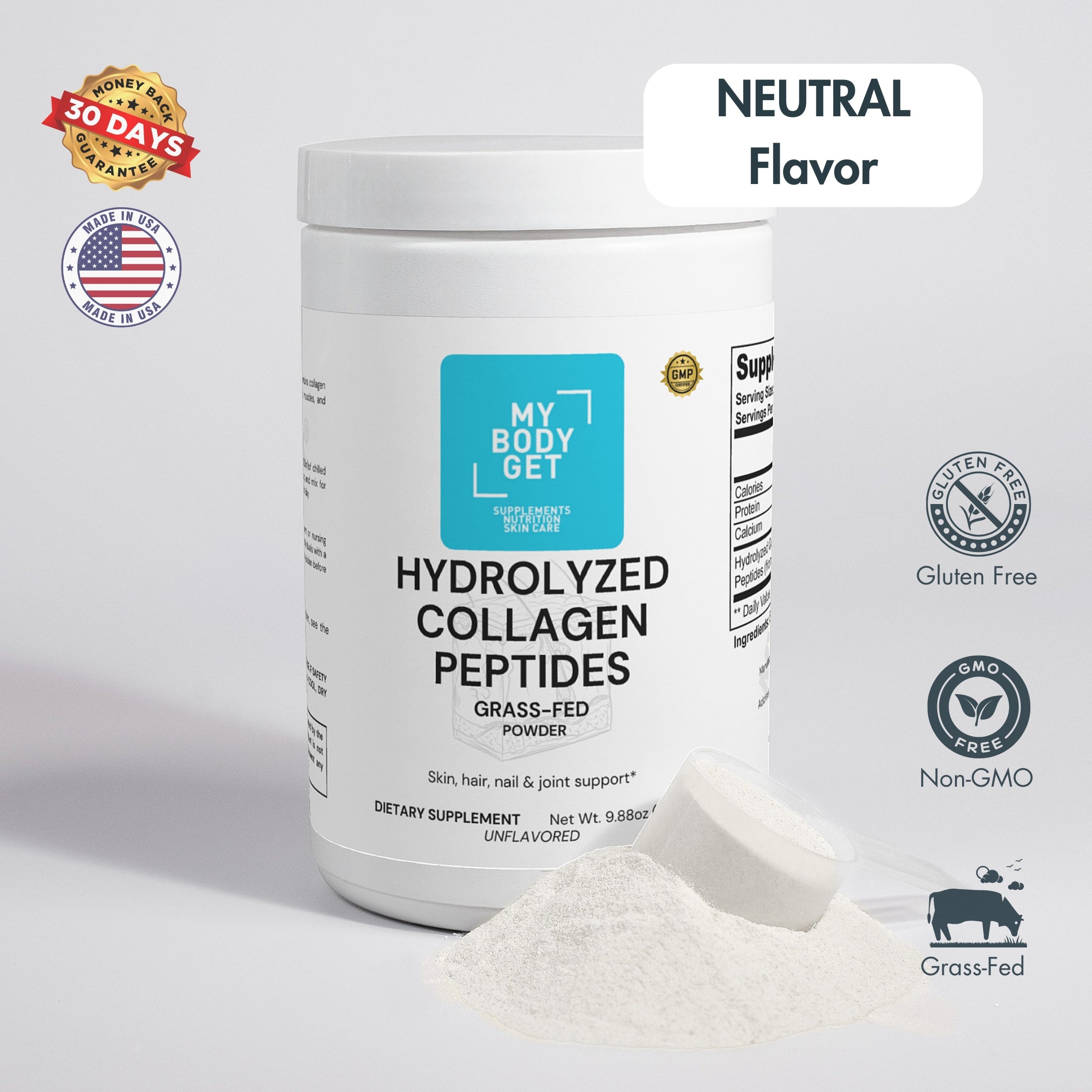Science Facts
Learn about the science behind every dietary supplements
Collagen and Skin Aging
Based on a study, ingestion of hydrolyzed collagen for 90 days effectively reduces skin aging, reducing wrinkles and improving skin elasticity and hydration.
Collagen and Osteoarthritis
Collagen supplementation revealed a significant decrease in the stiffness subscore, whereas the pain and functional limitation subscores did not have substantial differences.
Supplementation for Collagen Synthesis
Vitamin C-enriched gelatin and hydrolyzed collagen supplementation may improve collagen synthesis when taken 1 hr before exercise.
Collagen Peptides for Pain and Recovery
Recent findings show that collagen peptide supplementation improves pain and function and upregulates metabolic pathways associated with muscle and tendon growth.
Collagen Peptides for Skin Elasticity
Daily oral supplementation with collagen peptides combined with vitamins and other bioactive compounds improves skin elasticity and benefits joint and general well-being.
Collagen for Skin Health
The evidence obtained from systematic reviews indicated that oral administration of intact or hydrolyzed collagen improves the clinical manifestation of skin health.
Collagen for Bone Tissue Regeneration
In the last decades, increased knowledge about collagen's organization, structure, and properties (particularly concerning interactions between cells and collagen-based materials) has inspired scientists and engineers to design innovative collagen-based biomaterials and develop novel tissue-engineering products.
The potential role of supplemental leucine on muscle protein synthesis
This study suggests that increasing the concentration of leucine in an essential amino acid supplement consumed during steady state exercise elicits a greater muscle protein synthesis response during recovery
Protein and Recovery
Whey protein (WP) is a widely consumed nutritional supplement that enhances strength and muscle mass during resistance training (RT) regimens. Muscle protein anabolism is acutely elevated following RT, which WP further enhances.
Protein and Strength
Dietary protein supplementation significantly enhanced muscle strength and size changes during prolonged RET in healthy adults. Increasing age reduces, and training experience increases the efficacy of protein supplementation during resistance exercise training.
Protein and Appetite
A meta-analysis showed that whey protein might reduce the long and short-term appetite.
Protein and Obesity
A meta-analysis of a control group showed that whey protein supplementation seems to improve body weight, total fat mass, and some CVD risk factors in overweight and obese patients.
Protein and Body Composition
Whey protein that contains higher amounts of essential amino acids can considerably modify muscle synthesis. After extensive studies, results showed a significant increase in lean body mass after whey protein supplementation. Researchers found no significant changes between soya protein supplementation and body composition parameters.
Protein Therapeutic Applications
Whey, a protein complex derived from milk, is touted as a functional food with several health benefits. The biological components demonstrate a range of immune-enhancing properties. In addition, whey can act as an antioxidant, antihypertensive, antitumor, hypolipidemic, antiviral, antibacterial, and chelating agent. Several clinical trials have successfully concluded using whey to treat cancer, HIV, hepatitis B, cardiovascular disease, osteoporosis, and as an antimicrobial agent.
Protein and Fatigue
A study conducted on basketball players during and after training showed that taking whey protein powder can cause changes in hemoglobin, red blood cells, and hematocrit in the human body. So whey protein powder can improve exercise capacity and has an anti-fatigue effect.
Bee Bread Bioactivity
Bee bread is characterized by multiple pharmacological properties, proven in vitro and Vivo. Thus, it can be stated that bee bread offers a wide field for exploiting its benefits in the food and pharmaceutical industries.
Bee Bread for Reproductive Health
Treatment with bee bread upregulated testicular antioxidant enzymes, downregulated inflammation and apoptosis, increased proliferating cell nuclear antigen (PCNA) immunoexpression and improved lactate transport.
Bee Bread Antioxidant effects
The in vitro digestion results showed that the bioactive compounds in bee pollen and bee bread generally tended to decrease throughout digestion, with some exceptions.
Bee Bread and Hot Flashes
A study provided evidence that honey and bee pollen may improve the menopausal symptoms of breast cancer patients on antihormonal treatment.
Bee Bread for Muscles
During research refeeding diets that contained fresh monofloral bee pollen improved muscle mass and metabolism in old, undernourished rats.
Bee Bread Antimicrobial Effects
Bacteria of the genus Bacillus have been identified as an essential component of mature and stored BB and dried BP. Moreover, the study's outcomes revealed that BP and BB could be considered potential sources of bacteria-producing antimicrobial agents and/or enzymes of particular industrial importance.
Lion’s Mane Mushroom for Cognitive Functions
Scientists speculate that various chemical compounds, including hericenones, in the mushroom have multiple effects on the brain's neural networks and improve cognitive functions.
Cordyceps for Male Reproduction
Cordyceps Sinensis has various biological and pharmacological functions, and it has been claimed as a tonic supplement for sexual and reproductive dysfunctions for a long time in oriental society.
Reishi for Anti-Cancer Activity
Evidence from in vitro and in vivo studies has demonstrated that reishi possesses potential anticancer activity through immunomodulatory, anti-proliferative, pro-apoptotic, anti-metastatic, and anti-angiogenic effects.
Chaga for Antiviral Activity
One of the potential candidates against the SARS-CoV-2 virus may be Inonotus obliquus (IO), also known as Chaga mushroom.
Creatine Monohydrate for Athletic PerformanceDuring a study, creatine
During a study, creatine monohydrate supplementation over ten weeks showed a synergistic effect on aerobic power.
Creatine Monohydrate for Body Composition
Based on the magnitude inferences, consuming creatine immediately post-workout is superior to pre-workout vis-a-vis body composition and strength.
Creatine for Brain Functions
Preliminary studies indicate that creatine supplementation can increase brain creatine content in humans.
Creatine for Cognitive Function
Subsequent studies have demonstrated that cognitive processing, either experimentally (following sleep deprivation) or naturally (due to aging) impaired, can be improved with creatine supplementation.
BCAA for Sports
Scientists have proved that BCAA supplementation before and after exercise has beneficial effects for decreasing exercise-induced muscle damage and promoting muscle-protein.synthesis.
BCAA for Muscle Soreness
Studies showed that BCAA supplementation reduces delayed onset muscle soreness following exercise training.
BCAA for Metabolism
A study suggests BCAAs are the substrates for synthesizing nitrogenous compounds and serve as signaling molecules regulating metabolism.
L-Glutamine for Strength
Research shows L-Glutamine supplementation, mainly when associated with physical exercises, improves strength and power of knee muscles.
Vitamin D for Cholesterol
Vitamin D supplementation may be useful in hypercholesterolemia patients with vitamin D insufficiency who are at high risk of cardiovascular diseases.
Vitamin D for Infections
A study showed that vitamin D supplementation was safe and protected against acute respiratory tract infection overall. Patients who were very vitamin D deficient, and those not receiving bolus doses experienced the most benefit.
Vitamin D for Blood Pressure
Observational studies report higher blood pressure (BP) among individuals with lower 25-hydroxyvitamin D concentration.
Vitamin D for Mood
Results of a self-report measure showed that vitamin D3 significantly enhanced positive affect and there was some evidence of a reduction in negative affect when dealing with seasonality.
Anti-aging benefits of topically applied ascorbic acid
This study suggests that ascorbic acid (Vitamin C) is effective in improving signs of aging in human skin and plays a significant role in wound healing. Specifically, it helps reduce the appearance of wrinkles and minimizes elevated scars, indicating its beneficial effects on both anti-aging and skin repair processes.
Anti-aging properties of Sodium Acetylated Hyaluronate
This study suggests that sodium acetylated hyaluronate penetrates deeper into the skin, and protects the dermis from both intrinsic aging and external factors like UV and pollution. It inhibits collagen-degrading enzymes, reducing wrinkle formation and smoothing skin texture, making it effective for anti-aging skincare.
Magnesium For Stress
Magnesium supplementation has proven benefits for treating symptoms of daily psychological stress (fatigue, irritability, sleep). It has been shown that subjects with mental and physical stress can benefit from a daily magnesium intake.
Magnesium And Bone Health
Various dietetic investigations have shown that many people (about 20%) constantly consume lower quantities of Mg than recommended; moreover, in this category, a lower bone mineral density and a higher fracturing risk have been found.
The association between magnesium intake and cardiovascular health
This study suggests that lower dietary magnesium intake was associated with higher BP and stroke risk, which may have implications for primary prevention.
Magnesium For The Body
Based on magnesium’s many functions within the human body, it plays an essential role in preventing and treating many diseases. Low magnesium levels have been associated with many chronic conditions, such as Alzheimer’s disease, insulin resistance and type-2 diabetes mellitus, hypertension, cardiovascular disease (e.g., stroke), migraine headaches, and attention deficit hyperactivity disorder (ADHD).
Moringa and Blood Glucose
In conducted studies, moringa leaves have reduced glycemia without causing any adverse effects. The proposed mechanisms for reducing glycemia include inhibition of α-amylase and α-glucosidase activities, increased glucose uptake in the muscles and liver, inhibition of glucose uptake from the intestine, decreased gluconeogenesis in the liver, and increased insulin secretion and sensitivity.
Moringa Efficacy
Various animal studies have assessed the general safety of moringa extracts and have demonstrated a very high degree of safety.
Moringa for Health
Moringa possesses a wide range of medicinal and therapeutic properties through executing its potent anti-inflammatory activity, inhibiting the activation of NF-κB and PI3K/Akt pathways, mitigating oxidative stress by scavenging free radicals, and enhancing neuroprotective roles. In addition, Moringa can reduce the risk of cancer and modulate blood glucose. Therefore, Moringa provides the potential for the prevention or treatment of a series of chronic diseases.
Moringa and Ageing
Aqueous extract of moringa leaves (MOAE) was administered orally at a 200 mg/kg body weight dosage for 30 days. MOAE treatment showed a significant reduction in lipid peroxidation and lipofuscin pigmentation and elevated serotonin and antioxidant enzymes in the brains of treated groups of aged rats. The present result suggests the protective efficacy of moringa against age-related oxidative stress in the brain.
Maca for Sexual Desire
An improvement in sexual desire was observed with Maca since 8 weeks of treatment.
Improved semen parametrs in healthy men
Treatment with Maca resulted in increased seminal volume, sperm count per ejaculum, motile sperm count, and sperm motility.
Zinc and Blood Pressure
A study showed a significant reduction in systolic blood pressure (SBP) following zinc supplementation. However, zinc supplementation had no significant effect on diastolic blood pressure (DBP). In addition, no nonlinear association was found between supplementation dosage and duration with changes in both SBP and DBP.
Tribulus Terrestris for Sperm
The results of the present systematic review showed that the consumption of T Terrestris L., in general, resulted in the improvement of sperm parameters.
Magnesium for Body Health
Based on magnesium’s many functions within the human body, it plays an essential role in preventing and treating many diseases. Low magnesium levels have been associated with many chronic conditions, such as Alzheimer’s disease, insulin resistance and type-2 diabetes mellitus, hypertension, cardiovascular disease (e.g., stroke), migraine headaches, and attention deficit hyperactivity disorder (ADHD).
Curcumin and Arthritis
A study provides sufficient evidence to support clinical trials that could eventually lead to curcumin's acceptance as standard therapy for many forms of arthritis and possibly other inflammatory conditions.
Curcumin and Piperin
A study shows that in the dosages used, piperine enhances the serum concentration, extent of absorption, and bioavailability of curcumin in both rats and humans with no adverse effects.
Curcumin and Skin Health
Eleven studies were made to evaluate the effects of oral turmeric supplementation in the treatment of chronic inflammatory skin diseases. The skin conditions examined include psoriasis, pruritus, oral lichen planus, facial redness, and types of skin cancers. Overall, oral turmeric supplementation has shown therapeutic benefits for skin health.
Antioxidant and anti-inflammatory properties of curcumin
The desirable preventive or putative therapeutic properties of curcumin have also been considered to be associated with its antioxidant and anti-inflammatory properties.
Curcumin and Depression
Six clinical trials with 377 patients were reviewed In Meta-Analysis, comparing the use of curcumin to placebo. In patients with depression, the pooled standardized mean difference from the baseline Hamilton Rating Scale for Depression supports the significant clinical efficacy of curcumin in ameliorating depressive symptoms. Significant anti-anxiety effects were also reported in 3 of the trials.
Curcumin and Blood Lipids
According to the Meta-analysis that included seven eligible studies (649 patients), turmeric and curcumin may protect patients at risk of cardiovascular disease (CVD) by improving serum lipid levels. Curcumin may be used as a well-tolerated dietary adjunct to conventional drugs.
Curcumin and Inflammation
A study provides evidence for curcumin's anti-inflammatory effects and supports further investigation to confirm dose, duration, and formulation to optimize anti-inflammatory effects in humans with chronic inflammation.



